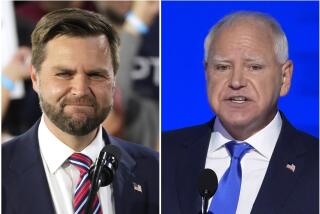The Conference CALLS : When Balancing the Ticket Becomes the Boldest Choice
WASHINGTON — By naming Sen. Lloyd Bentsen of Texas as his running mate, Michael S. Dukakis has made a bold choice. He has dared to pick someone who differs with him in style and ideology. As a result, Dukakis has offended those who believe a presidential campaign should make an ideological statement. Instead, he has relied on the first rule of vice presidential selection: Pick someone who will help you win.
Dukakis is supposed to be a cautious and conventional politician. But the cautious and conventional choice would have been Sen. John Glenn of Ohio. Glenn is just liberal enough for liberals and just moderate enough to sell in the South: a bookkeeper’s choice.
Choosing Bentsen makes a stronger statement, directed at Reagan Democrats who are not liberals. They number in the millions and have been deserting the Democratic Party in record numbers since the 1960s. What Dukakis is saying to them is, “Come home. There will be no ideological test.”
By choosing balance over uniformity, Dukakis has resurrected the old idea that the Democratic Party is a big tent. Back in 1952, the choice of Bentsen would have been conventional. Adlai E. Stevenson’s running mate that year was Sen. John J. Sparkman of Alabama. But in the new, reformed party system, those kinds of messy inconsistencies are supposed to have been sorted out. These days, parties are expected to offer the kind of ideological coherence pleasing to activists. Liberals flock with liberals and conservatives with conservatives.
The Democrats tried that three times. In 1968, 1972 and 1984, they nominated a northern liberal for President and a northern liberal for vice president: Hubert H. Humphrey and Edmund S. Muskie, George McGovern and Sargent Shriver, Walter F. Mondale and Geraldine A. Ferraro. The Democrats did about the same each time--roughly 40% of the vote. In other words, three catastrophes.
Dukakis appears to have finally learned the lesson. Democrats cannot win by defining themselves as a liberal party. They have to offer more--particularly to the South, which will not support a ticket of liberals. Hence, Bentsen.
The Democrats have never won the presidency without carrying Texas. Bentsen makes the Democrats competitive in Texas--though it will still be an uphill battle to defeat George Bush in his home state. Will Bentsen make the ticket competitive in other Southern states? Probably, because his nomination is a clear response to the issue of Southern resentment. Southern Democrats have become increasingly resentful about being written off by the party. They organized the Southern regional primary on Super Tuesday to try to prevent another Democratic ticket like those of 1968, 1972 and 1984. The South was saying “No more Mondales.”
Sen. Albert Gore Jr. of Tennessee ran for President this year on the issue of Southern resentment. It won him five Southern states on Super Tuesday. Unfortunately for Gore, Southern resentment is not much of an issue in Illinois or New York. But it is a real issue in the South. Dukakis is saying to Southern Democrats, “I hear you.”
Dukakis knows that the Democrats cannot win the presidency without being competitive in the South, and a Northeastern urban ethnic liberal like him needs help there. The only way the Democrats have ever won is with a coalition of the Northeast, the industrial Midwest and the South. Look at a map of states the Democrats carried in 1960 and 1976. Those two winning coalitions cut across the Mason-Dixon line. There was a Southerner on the ticket both times.
The choice of Bentsen was bold--also risky. In the old days, when ideological requirements were less rigorous, a ticket was supposed to balance. Now, instead of praising a ticket for being “balanced,” we criticize it by saying the candidates “clash.”
That is certainly the case with Dukakis and Bentsen. Their ideologies clash. Dukakis is a liberal and Bentsen is a moderate. They differ on many issues: Bentsen supports an oil import fee--he is a Texan, after all--and he has voted for the Reagan tax cuts, aid to the Contras and the MX missile. Bentsen does have a good civil-rights record, however, and he is far less conservative than Sen. Sam Nunn of Georgia, the other leading Southern prospect for the ticket.
Their styles clash even more than their ideologies. Dukakis is a reformer. Bentsen is a regular. Bentsen heads a powerful Texas political organization. He has the image of a wheeler-dealer. He was embarrassed last year when the story got out that he had invited lobbyists to join his $10,000 breakfast club. Bentsen also gets more money from political action committees than almost any politician in Washington. Dukakis doesn’t accept PAC money and favors PAC reform. In short, Bentsen is a classic Texas power-broker--just like Lyndon B. Johnson, who happens to hold the record for the biggest landslide in U.S. history.
Who cares if Dukakis and Bentsen “clash”? A lot of liberal activists do--which is why they are so upset over Dukakis’ choice. Journalists also care, and they are going to try to make a big issue over the differences between Dukakis and Bentsen. There is not, however, evidence that voters much care about ideological consistency as long as the two candidates get along. You want a vice president who is loyal, obedient and obsequiously agreeable? Try Bush.
The choice of Bentsen will drive Bush crazy. Bentsen defeated Bush in the 1970 Texas Senate race. With Bentsen on the ticket, Bush is not safe anywhere, not even in his home state. Bentsen has taken over the powerful Texas get-out-the-vote operation that used to be controlled by L.B.J. and former Gov. (and former Democrat) John B. Connally. That organization carried Texas for Humphrey in 1968; it was the only Southern state he carried. Jimmy Carter won Texas on Bentsen coattails in 1976 (Bentsen 57%, Carter 51%). When Bentsen was reelected for a third term in 1982, he carried with him a Democratic governor and a statewide slate of progressive Democrats. As for 1988, Texas is still in an oil bust. That does not make Bush’s prospects any happier.
If the first rule of vice presidential selection is to pick someone who will help you win, the second is to pick someone who will unify the party--especially after a divisive nominating campaign. That is what Dukakis did not do. The choice of Bentsen means that the Jesse Jackson movement is left off the ticket. Jackson supporters are understandably angry and there is a real possibility that they may try to disrupt the convention this week. And why not? There will be 20,000 reporters there and no real news to report.
What if Jackson resists Dukakis’ choice? If he does, Dukakis can score points by standing up to Jackson and saying, “Go ahead, make my day.” A confrontation with Jackson will only make Dukakis look tougher. Dukakis has seldom looked better than when he said last week, “Jesse Jackson can do anything he wants to do. I’m going to the convention and I’m going to win it.” Dukakis has the votes and Jackson knows it. Dukakis also knows that there are more than a few Democrats who would like to see Jackson put down.
In the end, it is unlikely that many Jackson supporters will stay home or support Bush on Nov. 8. Jackson voters are mostly hard-core Democratic partisans. Most have suffered under the Reagan presidency, and they don’t want to do anything to hurt Democratic prospects. Clearly Dukakis has to treat Jackson with respect and offer him a significant role, but as for justifying his choice of Bentsen, all Dukakis has to say is, “You want to win? This is the way to do it.”
In announcing his choice, Dukakis recalled 1960, when another Massachusetts ethnic liberal chose a Texan as his running mate. It worked--just barely, and only with a little extra effort from Chicago Mayor Richard J. Daley. Will it work again? Daley isn’t around any more. And Chicago political power is now in the hands of blacks.
More to Read
Get the L.A. Times Politics newsletter
Deeply reported insights into legislation, politics and policy from Sacramento, Washington and beyond. In your inbox three times per week.
You may occasionally receive promotional content from the Los Angeles Times.










